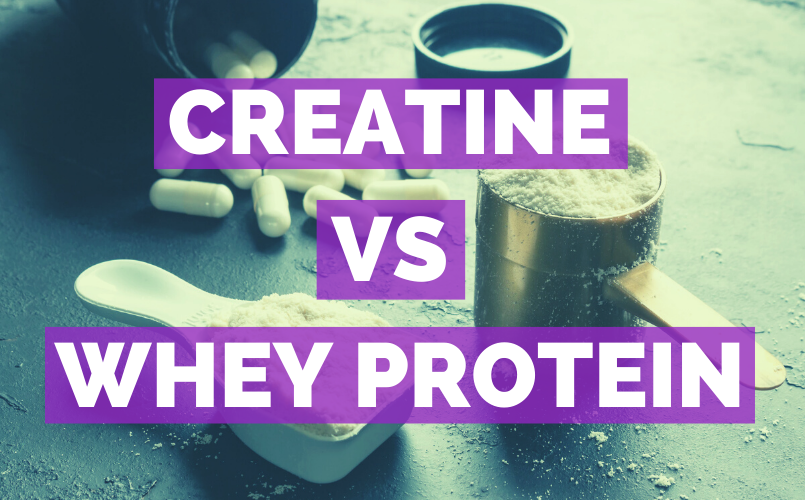Working out to reach your goals can be a tough cookie. Losing weight and building muscle without proper support is a long process and not necessarily a successful one.
You can easily find yourself at a dead-end, where, no matter how often you train and what you eat, you can’t seem to progress.
That’s where the supplements come in. There are popular for a reason; not only can they help you achieve your athletic goals. More importantly, they provide effective results that increase your motivation, enabling you to train longer and harder both mentally and physically.
Creatine and whey protein are one of the most popular supplements today. They help with fat burn, weight loss, muscle building, and increase muscle recovery.
They seem to have the same benefits; should you really take both to get the most out of your workouts? The answer may surprise you!
Table of Contents
What are Creatine and Whey Protein?
Creatine supplements and whey protein are both unique, but it would be wrong to say one is more effective than the other. In fact, they are both important since they benefit us in different ways. What’s more, for the best effects, many athletes and personal trainers recommend taking both of these together for maximum results. However, as an essential chemical feature of muscle synthesis, it is instrumental in putting on muscle and getting real gains from your training and workouts.
Honestly, for many people, a choice of protein and creatine isn’t an either-or scenario. For best effects, you should stack up on both to boost muscle mass and improve athletic performance. Let’s have a look at why these two are important and why combining them provides the best results!
Creatine – How Does Whey Creatine Work?
It is naturally produced in our muscles. It increases energy production during high-intensity workouts.
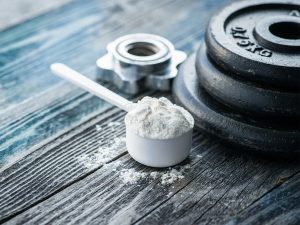 In other words, it helps to enhance adenosine triphosphate (ATP) in the body, a compound that increases energy for muscles. When we supplement creatine, it helps to boost muscle mass, strength, and performance.
In other words, it helps to enhance adenosine triphosphate (ATP) in the body, a compound that increases energy for muscles. When we supplement creatine, it helps to boost muscle mass, strength, and performance.
But it’s important to note that creatine like a pre-workout is used very quickly by our bodies. The energy that it produces only lasts for about 10 seconds, so stacking on creatine enables you to get the most of your fitness training sessions at the gym.
Apart from that, creatine supplementation also draws water to the muscles.
That means it helps to maintain your muscles hydrated and increase protein synthesis. In other words, it helps you get bigger and stronger.
Many foods are rich in creatine, such as meat and dairy. However, getting enough creatine helps (5 grams) from food only is almost impractical. It’s also common for vegetarians and vegans to supplement with creatine.
The most common type of creatine is monohydrate, but there are many other types available.
Whey Protein – How Does Whey Protein Work?
This is one of the primary proteins in dairy. It’s a by-product of cheese production. This type of protein is considered to be of the highest quality. It’s a popular supplementation with bodybuilders and athletes.
Supplementing whey protein and creatine can help increase muscle recovery and muscle mass. What’s more, this also means it can benefit you to improve your strength and power. The recommended amount of whey protein for people to achieve their athletic goals is between 20 to 25 grams.
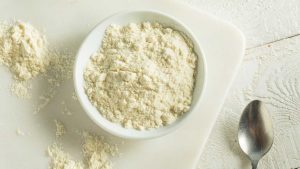
Working muscles need to recover to reach the best results, and whey protein powder can help you repair and replenish muscle. Taking the correct amount before or post-workout increases the chances of success effectively.
Like creatine, whey protein powders also contain amino acids, but this type of protein contains all nine essential amino acids, such as BCAAs (branched-chain amino).
These acids help to sustain your muscles and prevent your body from using protein for energy. In other words, it helps to repair the muscles and build new, even stronger muscle tissue.
SUMMARY
Creatine is naturally found in our bodies and it helps to grow muscles, increase strength, and boost energy levels. Whey protein increases muscle mass and strength while repairing our muscles and sustaining them.
Creatine vs Whey: Which One Is Preferred For Muscle Gains?
Creatine vs Protein, both of these supplements promote muscle gain in a different way. So creatine isn’t necessarily better and vice versa.
Creatine
- Boosts energy levels by boosting ATP levels in the body
- Enables you to work out harder and longer
- Helps to increase muscle strength and power
- Enhances muscle growth
- Gives muscles a fuller look
Whey protein powders
- Increases muscle growth
- Helps to regenerate muscles and minimize their recovery time
- Convenient protein source on the go
- Helps to sustain muscle mass
To be honest with you, if you’re on a strict budget, I’d recommend you take creatine instead of protein for a simple reason. You can get creatine from foods, but it’s impossible to reach the recommended amount of 5 grams a day just through food.
On the other hand, you can easily meet the protein requirements with a healthy diet, so you can already achieve great results with a carefully designed meal plan and supplements.
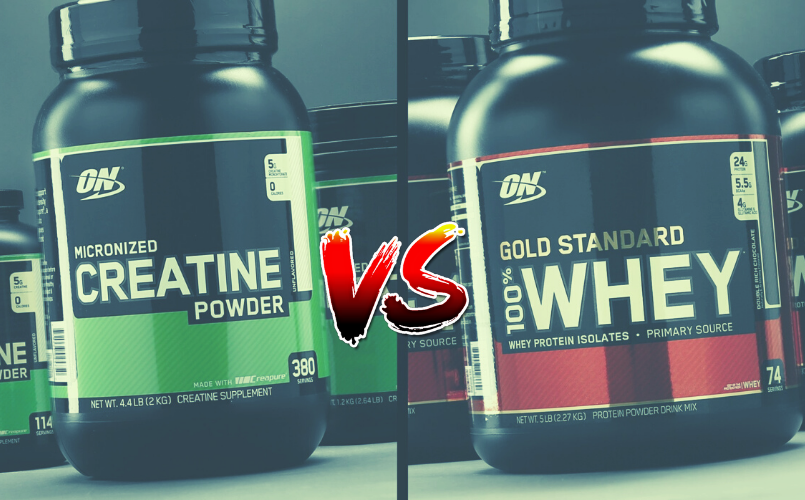
But if you want to reach the best effects and get the most out of your workout, taking them together is the best option.
SUMMARY
Creatine and whey protein both help to build mass in their own specific way. It’s best to take them together but if you’re struggling with money, take creatine as you can’t get enough from it just by eating a balanced diet.
When to Take Creatine: The Best Time?
The best time to take creatine is before, during, or after exercise; you can pick when it works best for you. To get results, you’ll have to take it daily for at least four weeks.
SUMMARY
Pick the time to take creatine that works for you best; timing isn’t that important as long as you take it regularly in the correct amount.
Is Creatine a Protein?
Creatine isn’t a protein, and it also works differently than protein. What’s more, it doesn’t contain any protein. It’s a natural compound that’s present in our bodies in small amounts.
SUMMARY
It isn’t a protein and it doesn’t contain any protein either.
Is Creatine or Protein Better After a Workout?
Research has shown that taking protein powder before or after a workout doesn’t have any influence on muscle strength or size. You’ll want to stack up on protein powder when you’re exercising to boost muscle recovery, and other benefits mentioned above, but it the time when you take it, isn’t important.
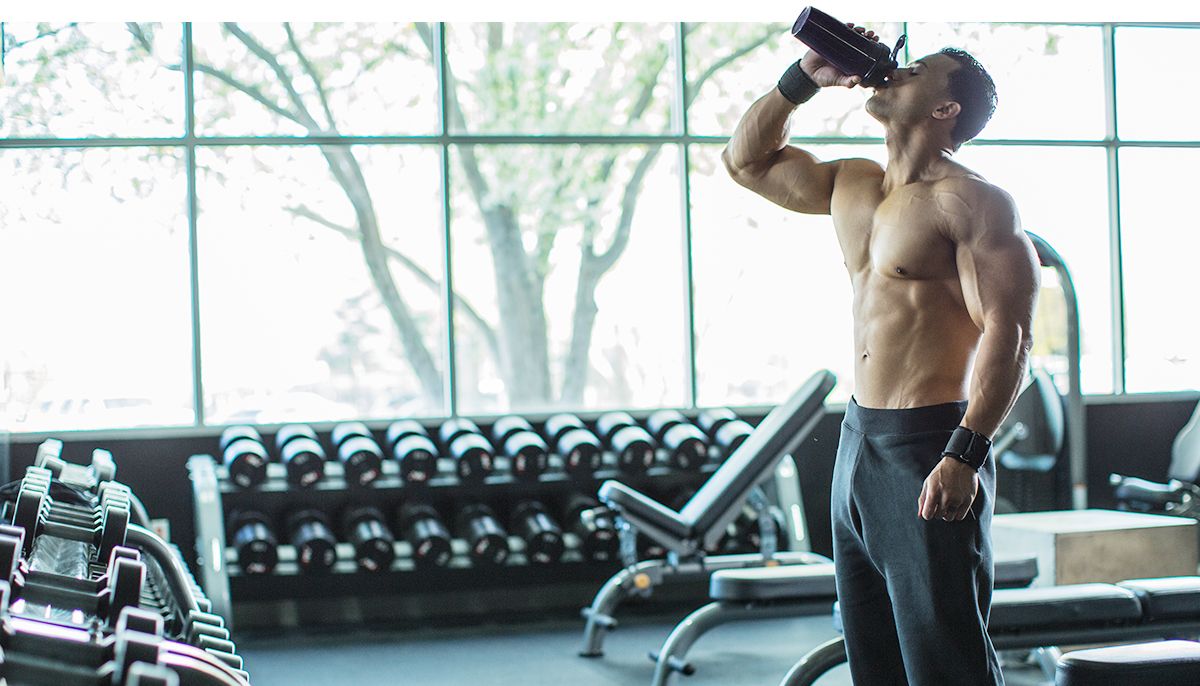
The same goes for creatine, but research has shown that it’s best to take it shortly before or shortly after a workout. But, another research confirmed that it makes no difference whether you take it before or after a workout.
SUMMARY
According to research, it doesn’t matter when you take either of these supplements. You can choose the time that works for you best, either before or after a workout.
Any Supplement Advice?
Before you leave, let’s say a few words about the protein supplements available on the market today. You can exercise and eat a balanced diet, but supplements play an important role in any athlete’s life, especially if you want to build muscles, grow bigger, and stay healthy at the same time.
As a personal trainer, I’ve tested and tried dozens of products; some completely blew me away, and I keep recommending them to my clients; others never made it past the trial period.
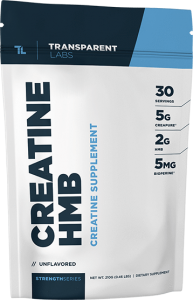 It’s important to know that there are many different options available, but not all are created equal. Many supplements contain ingredients that are either fillers or cause side effects.
It’s important to know that there are many different options available, but not all are created equal. Many supplements contain ingredients that are either fillers or cause side effects.
As a professional trainer, I know that both fillers (especially when you’re counting the calories of everything you eat) and side effects are unwanted and represent an obstacle on your way to success.
What I’m telling you now, I also always explain to my clients: if you consume trash, you can’t expect to reap results and stay healthy. Once they realized how important quality supplements really are, they keep asking for recommendations, and we even started testing a few products together.
What works for me won’t necessarily work for you, but there has been one protein supplementation that we discovered to be the most helpful for the widest audience.
The one supplementation I keep advising my clients is based on science-backed claims and ingredients with clinically effective dosages that provide excellent support for anyone who’s looking for quality creatine.
Transparent Labs and their HMB is a clean and pure supplementation without any fillers, artificial ingredients, harmful additives, proprietary blends, and ingredients that would cause any side effects.
It is science-based, coming from a respected and trusted brand that knows its products and the demands of its users very well.
We’ve put this supplementation to the test dozens of times, and it’s proved its effectiveness every time. It’s changed the way I and my clients think about a workout, and these are the results you can expect within a couple of weeks, based on our experience:
- Boosts strength and power
- Increases endurance and fitness goals
- Promotes fat burning process
- Prevents any lean muscle loss
They base their formula on creatine monohydrate, HMB, and Bioperine. The flavoured option also contains blue raspberry flavor, citric and malic acid, and stevia.
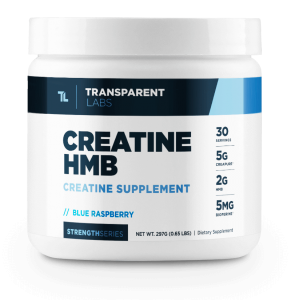 Creatine monohydrate, in combination with HMB, increases lean mass and strength. It used is from Creapure, the purest source available for maximum effects.
Creatine monohydrate, in combination with HMB, increases lean mass and strength. It used is from Creapure, the purest source available for maximum effects.
HMB creatine has been shown to increase strength and muscle mass and reduce fat.
Bioperine is a black pepper extract, which helps to increase the absorption of the supplementation.
Apart from that, the product dissolves well, which is an advantage, and a blue raspberry flavor is a great option if that’s something you’re into.
I’m not a fan and prefer an unflavoured option, but the flavored kind of reminds me of a Gatorade. It’s drinkable, and it mixes easily with any drink.
In any case, you’ll be drinking a clean product and won’t cause any damage to your body with harmful ingredients. I was first drawn to Transparent Labs because of their transparency, and I’m glad to try them.
Keep in mind though that you have to stay hydrated when supplementing on creatine. And for best effects, take this supplement 30 minutes following your workout.
SUMMARY
Stick to high-quality supplements to reap the best results while staying healthy, getting stronger, and fulfilling your athletic goals. One of the best supplements available is Creatine HMB, which I recommend to my clients regularly. It’s a no-nonsense supplementation that delivers effective and visible results every time.
Does Creatine Affect You Sexually?
Of course, there are all kinds of ways to test that, but we do have a pretty good way to see that. My own testosterone levels are constantly fluctuating. I’m always getting into these emotional states where I feel like a guy and then I get into these other states where I feel like a woman. So, we can test for testosterone. We can measure testosterone, and then we can also do a 4-Hour testosterone test. So, we know that a guy has higher testosterone levels if he’s experiencing emotional states that feel feminine.
To the extent that someone is a little bit gay and a little bit straight, we can predict their testosterone levels. If you’re experiencing low testosterone, we can’t do anything. But if you’re experiencing high testosterone, you are probably having more sex with men. That’s because a lot of your testosterone is being used up for sex. We could predict that someone who is gay and who is experiencing more feminine feelings has more sex with men. I would say that if you’re looking for evidence, it’s that. People don’t believe me, and some people think that’s my attempt to pick on gay guys. That’s not it at all. I would encourage people to look into the research on this because it’s not a very well-known topic.
Does Whey Protein Contain Creatine?
Whey protein can be taken either in its liquid form or in powder form. You can either take it in liquid form as opposed to powder form. The protein found in the liquid form is water-soluble, which means that this protein gets easily dissolved in the water and this becomes easy for you to take. But the protein found in the powder form is protein crystals and these protein crystals are not water-soluble. These protein crystals are very hard to dissolve in water. This is why whey protein that is in powder form is harder to digest than in liquid form.
If you are taking a protein shake that is not Whey Protein, make sure to take enough of the protein shake so that the protein powder does not get hard. Consequently, if you are taking Whey Protein without adding any whey, you might experience constipation.
Is Creatine Enough to Build Muscle?
Caffeine may be the go-to prescription for growing muscle, but caffeine comes with its own problems. The main drawback is that it doesn’t provide much in the way of amino acids, so you’ll need to combine caffeine with other Sports Nutrition supplements to really see gains in your muscle mass. On the plus side, caffeine offers several times the protein of creatine, a stimulant that’s easily absorbed through the skin. There are dozens of studies on the benefits of creatine for muscle growth, so I won’t spend a lot of time on it. Just remember that the creatine ingested orally also gets absorbed by the body, and researchers often test how much of the supplementation a subject ingests and its absorption rates.
If you’re not sure if it’s right for you, do some research, read the label, and make sure you know how much you should be taking each day. Now, as for the other issue, creatine can cause negative side effects—even when you use it correctly. For example, caffeine itself can cause a person to become jittery or irritable, so if you experience any of these side effects when using creatine, it might not be the right supplementation for you. That’s not to say that creatine doesn’t have benefits—if you can handle the side effects, the amount of supplementation needed to see muscle-building gains may not be an issue.
Does Creatine Make You Bigger?
One of the most common questions that we get asked by potential athletes is “What does creatine do to make me bigger?” It’s a good question, but it’s a hard one to answer. We know that there are certain mechanisms of action and certain molecules and that when we combine these molecules with different athletes, we can see some pretty remarkable results. But to actually answer the question of what creatine does to make you bigger is a bit more difficult.
We know it is part of a bigger picture of nutrients that helps in the development of muscle, but it’s not the only part. The effects of creatine have been debated for over 20 years and many different hypotheses and theories have been developed to explain the effects of creatine on the human body. So the answer to that question is…maybe.
Frequently Asked Questions
Is Whey Considered Creatine?
No, whey protein and creatine are two distinct substances with different properties and functions. Whey protein is a complete protein derived from milk and is composed of various amino acids, including the essential amino acids necessary for muscle protein synthesis. It is commonly used as a dietary supplement to support muscle recovery, growth, and overall protein needs. On the other hand, creatine is a naturally occurring compound found in small amounts in foods like meat and fish. It plays a crucial role in energy metabolism, specifically in the production of ATP, the body’s primary energy source.
Creatine is typically consumed as a separate supplement and is available in various forms such as creatine monohydrate. Its primary purpose is to enhance athletic performance and promote muscle strength and power by increasing the availability of ATP during high-intensity activities. While both whey protein and creatine can be beneficial for individuals engaged in resistance training and exercise, they have different mechanisms of action and serve distinct purposes. Therefore, it is important to recognize that whey protein and creatine are not interchangeable and serve different roles in the context of sports nutrition and supplementation.
Is Creatine Better Than Protein for Workout?
Creatine and protein serve different purposes when it comes to workouts, so it is not accurate to say that one is better than the other. Creatine is primarily involved in energy metabolism, specifically in the production of ATP, which is crucial for high-intensity exercise. By increasing the availability of ATP, creatine supplementation can enhance strength, power, and overall exercise performance, particularly during short-duration, explosive activities.
On the other hand, protein plays a vital role in muscle repair, growth, and recovery. It provides the essential amino acids necessary for muscle protein synthesis, which is essential for building and repairing muscle tissue after intense workouts. Protein supplementation, such as whey protein, can help meet daily protein requirements, support muscle recovery, and promote muscle hypertrophy when combined with resistance training.
Therefore, rather than comparing creatine and protein as superior or inferior to each other, it is more accurate to view them as complementary supplements that can support different aspects of your workout routine. If your goal is to enhance explosive strength and power, creatine supplementation may be beneficial. If you are primarily focused on muscle recovery, growth, and repair, protein supplementation, including sources like whey protein, can be advantageous. It is important to consider your individual goals and consult with a healthcare professional or registered dietitian to determine the most suitable approach for your specific needs.
Should I Eat Creatine and Whey Protein?
Absolutely! Including both creatine and whey protein in your diet can be advantageous for muscle building and performance. Creatine and whey protein serve distinct purposes and work synergistically when incorporated into a comprehensive training regimen and balanced diet.
Creatine, a naturally occurring compound, plays a vital role in energy production during high-intensity workouts. By replenishing adenosine triphosphate (ATP), the primary fuel for muscle contractions, creatine supplementation can enhance muscle strength, power, and overall exercise performance.
Whey protein, derived from milk, is a high-quality protein source abundant in essential amino acids, including branched-chain amino acids (BCAAs). These amino acids are crucial for muscle protein synthesis and facilitate muscle recovery and growth. With its excellent digestibility and absorption rate, whey protein is especially effective as a post-workout supplement.
Combining creatine and whey protein allows you to benefit from their unique properties. Creatine enables you to push harder during intense training sessions, potentially stimulating greater muscle adaptation. Meanwhile, whey protein supplies the necessary amino acids to support muscle repair and foster the muscle-building process.
While creatine and whey protein are generally safe and popular supplements, it is advisable to consult with a healthcare professional or a registered dietitian before introducing them to your routine. They can offer personalized advice considering your specific needs, goals, and any underlying health conditions.
Furthermore, it is essential to maintain an overall well-balanced diet that includes a variety of nutrient-dense foods. Creatine and whey protein supplements should be regarded as valuable additions to support your dietary goals.
Does Creatine Increase Testosterone?
Although creatine supplementation has been shown to have various benefits for muscle performance, it does not significantly increase testosterone levels. Testosterone is a hormone responsible for muscle growth and development, but creatine does not directly influence its production or release in the body.
Research studies examining the effects of creatine supplementation on testosterone levels have consistently shown that creatine does not cause significant changes in testosterone concentrations. Instead, the primary mechanisms through which creatine enhances muscle performance are by increasing phosphocreatine stores in the muscles and improving ATP regeneration, which provide energy for muscle contractions.
It is important to note that some studies have reported small, temporary increases in testosterone levels immediately after resistance training, regardless of creatine supplementation. However, these acute spikes in testosterone are short-lived and unrelated to the use of creatine.
While creatine does not increase testosterone levels, it can indirectly support muscle growth by improving workout performance and increasing muscle strength and power. By enabling individuals to train harder and recover more effectively, creatine supplementation can enhance muscle adaptation and stimulate muscle growth over time.
Can I Replace Creatine With Whey Protein?
When you’re keeping up with a regular workout routine, your body’s craving more protein to meet the increased demands and prevent muscle loss. That’s when people turn to protein supplements like whey protein to help out. Whey protein steps in to fulfill those extra protein needs alongside a protein-rich diet, which ultimately promotes muscle synthesis.
Now, let’s talk about creatine. It’s more of a support supplement that boosts your stamina and provides extra strength. But really, we can’t compare creatine and whey protein—they serve different purposes altogether. If you absolutely had to choose between them, go for whey protein.
Whey protein is great for building muscle, while creatine mainly draws water into your muscle cells, making your existing muscles look bigger. Taking them together can be beneficial, especially if you’re into progressive strength or weight training. But if you’re only picking one, go with whey protein.
Remember, each supplement has its own role in supporting your fitness goals, so it’s all about finding what works best for you.
Should Skinny Guys Take Creatine or Protein?
As skinny guys, or “ectomorphs,” our primary goal is to gain weight and build muscle mass. When it comes to choosing between creatine and protein supplements, it’s essential to consider our specific needs and objectives.
Firstly, let’s talk about protein. As ectomorphs, we require a higher calorie intake to support weight gain and muscle growth. Protein supplements, such as whey protein powder, offer a convenient and efficient way to increase our protein intake without adding excessive bulk from other macronutrients. Protein powder provides essential amino acids necessary for muscle repair and growth, aiding in the development of lean muscle mass. Additionally, protein supplements can help increase appetite, making it easier to consume the surplus calories needed for bulking.
Now, let’s address creatine. Creatine is known for its ability to enhance strength and muscle performance during high-intensity activities like weightlifting. While it can be beneficial for increasing strength and improving workout performance, it may not directly contribute to weight gain or muscle growth in the same way that protein does. For ectomorphs focused on bulking, prioritizing protein intake to support muscle protein synthesis and overall caloric surplus is more crucial than supplementing with creatine.
In summary, for skinny guys aiming to gain weight and build muscle mass, prioritizing protein supplements like whey protein powder is more beneficial than creatine. Protein supplements provide essential amino acids, promote muscle protein synthesis, and help increase calorie intake, all of which are essential for achieving our bulking goals. While creatine may have its benefits for strength and performance, it is secondary to meeting our increased protein and calorie needs as ectomorphs.
Final Words
Creatine and protein and two popular supplements that people take when they want to build mass, boost athletic performance, and increase energy levels.
Many people believe they should take one or the other when these two are best taken together; at least that’s what many professional athletes do.
After all, creatine increases ATP levels in the body, provides muscles with enough energy to keep going, and helps to build muscle strength, power, and mass with regular use.
Whey protein powder contains all nine essential amino acid profiles, and while it helps to build mass, it also shortens muscle recovery time, enabling you to train regularly without losing lean muscle.
While it’s best to combine both, there is one of these I’d recommend for all who want to pick one over the other. The trick is that you can get a decent amount of protein from food. All you have to do is plan your menu carefully to include as much quality food as you can.
On the other hand, while creatine is naturally found in our bodies and you could theoretically get it from nutrition (food), you’d need to eat a lot of steaks to fulfill the 5-gram creatine requirement a day. So, I’d recommend taking creatine as a supplement if you have to pick one of these options.
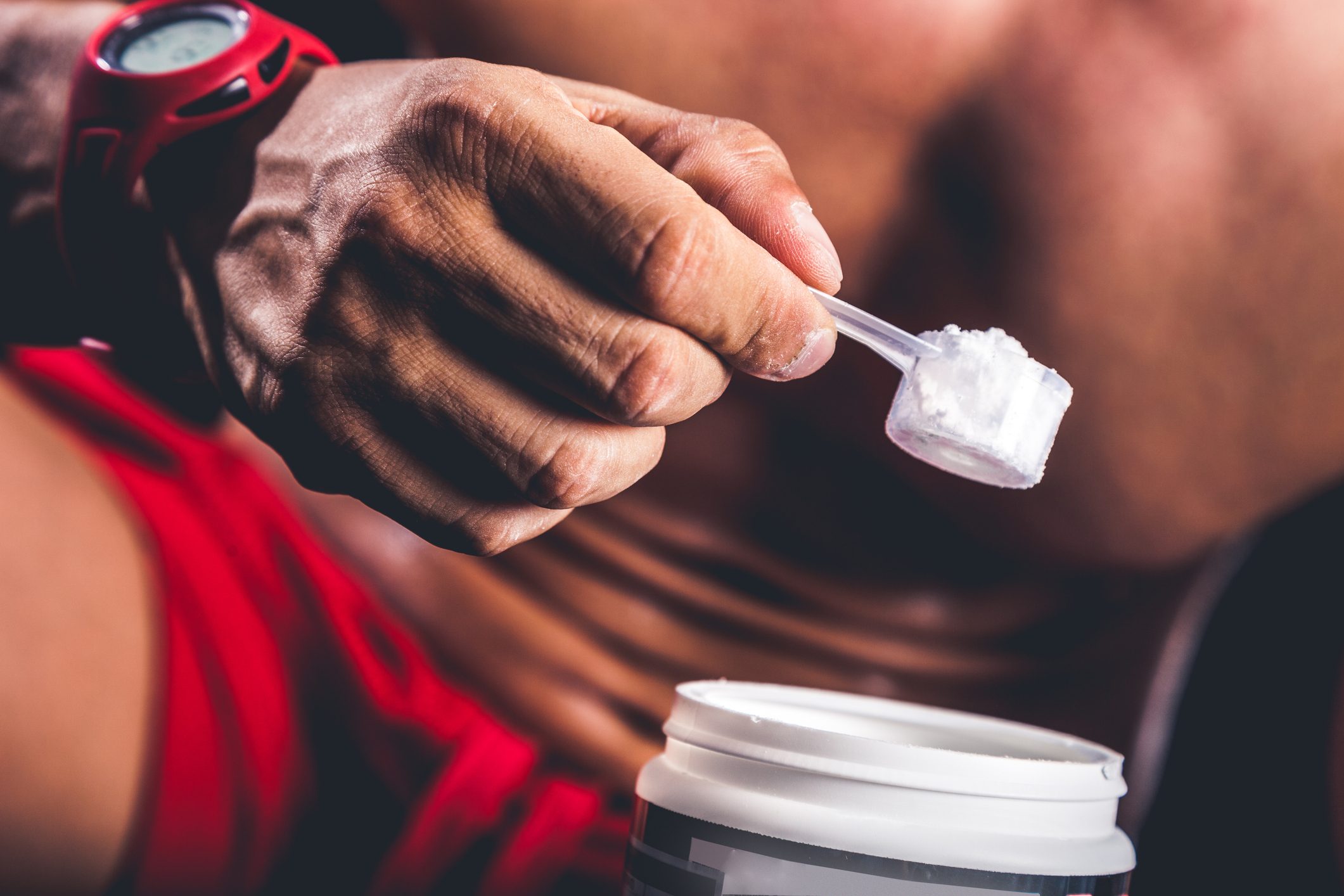
There are many creatine products available, and some are very effective, but many are loaded with ingredients that aren’t beneficial for people who want to live healthily and lose weight.
Make sure to double-check the label and the brand’s transparency policy before you start supplementing their products. It took me a long time to discover high-quality brands, and I wouldn’t change them for any other as the results were actually real without the nasty side effects.
If I had to choose one, I’d go for Transparent Labs and their Creatine HMB because it’s a pure and clean product without any harmful and useless fillers. The supplement is spot on; designed with clinically-based ingredients, it’s something me and my clients normally keep in the kitchen.
The great thing about this supplement is that the unflavored version contains only 3 ingredients, and it grows muscle mass effectively with regular use. Keep hydrated when taking this, and it will increase strength and power, all the while helping you burn excess fat.
It’s one of a kind supplement that’s a great alternative for all who’ve given up on supplements that were loaded with crap and ineffective proprietary blends.

